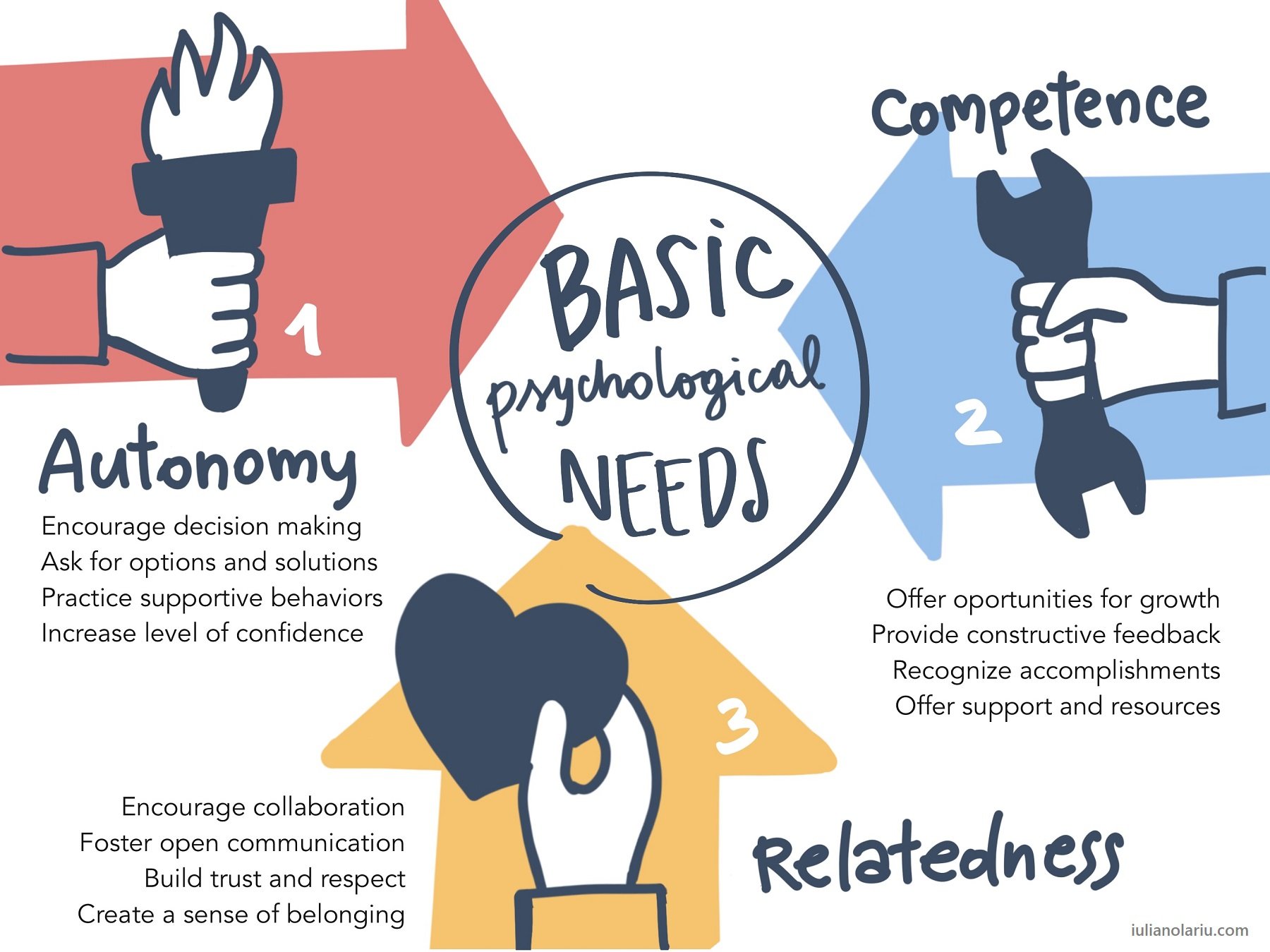Basic Psychological Needs
Self-Determination Theory (SDT) is a framework for understanding human motivation and personality development that was developed by psychologists Edward Deci and Richard Ryan. According to the theory, people have three fundamental psychological needs: autonomy, competence and relatedness.
While competence refers to the need to feel capable of and effective in achieving goals, autonomy refers to the need to feel in control of one's own life and decisions. The term "relatedness" describes the need to have a sense of belonging and connection to other people.
According to SDT, people are more likely to be intrinsically motivated and engaged in their activities when these fundamental needs are fulfilled. On the other hand, individuals are more likely to feel bad emotions and lose motivation when these needs are hindered or not met.
Here are some strategies to encourage the fulfilment of these three basic psychological needs: autonomy, competence, and relatedness.
Autonomy is the perception that something is happening independently.
Encourage decision-making by giving the person the opportunity to make a choice and by supporting their choices, even if you disagree with them. People may feel more in the driver's seat as a result of this.
Ask for options and solutions. Encourage the individual to think creatively and innovatively, and assist them in exploring new ideas and approaches. They may feel more in charge of their own problem-solving and decision-making processes as a result of this.
Practice supportive behaviours. Provide a safe and encouraging environment where the person can express themselves and take risks. They may feel more confident in their capacity to make their own decisions as a result of this.
Increase level of confidence. Provide support and direction, but refrain from trying to change the person's decisions or behavior. They may feel more confident and in control of their own life as a result.
Competence means feeling effective and capable in the activities people are engaged in.
Offer opportunities for growth. Provide opportunities for the person to learn new skills, take on new responsibilities, or participate in challenging projects. This can help them develop their abilities and feel more confident in their abilities.
Providing constructive feedback requires being specific, insightful, and focused on both the person's strengths and areas for development. When someone is aware of their strengths and weaknesses, they may feel more capable of improving.
Recognize accomplishments: Regardless of how small, acknowledge and appreciate the person's accomplishments. This can motivate them to continue striving for improvement by making them feel good about their accomplishments.
Offer resources and support: Offer assistance and resources that will enable the person to accomplish their objectives, such as instruction, mentoring, or access to technology and other resources.
Relatedness is feeling secure and connected with the people around.
Encourage collaboration Provide opportunities for the person to collaborate with others on projects or activities, and encourage them to share their skills and knowledge with others. This can help build a sense of shared purpose and achievement.
Foster open communication: Encourage open and honest communication between the person and others, and help them practice effective communication skills. This can help build trust and understanding between the person and others.
Build trust and respect Foster a culture of trust and open communication, where the person feels comfortable sharing their thoughts and ideas. This can help them feel more in control of their own interactions and relationships with others.
Create a sense of belonging by emphasizing the shared values, goals, or interests of the group, and highlighting the ways in which the person's contributions are valued.
Overall, developing internal motivation in others involves creating a sense of purpose, encouraging autonomy and learning, providing positive feedback, connecting to personal values, offering choice, and encouraging curiosity. By doing so, you can help the person find intrinsic reasons to pursue the task or goal and be more motivated to do so.
If you want to learn about my upcoming visual notes and articles, follow me on social media:
